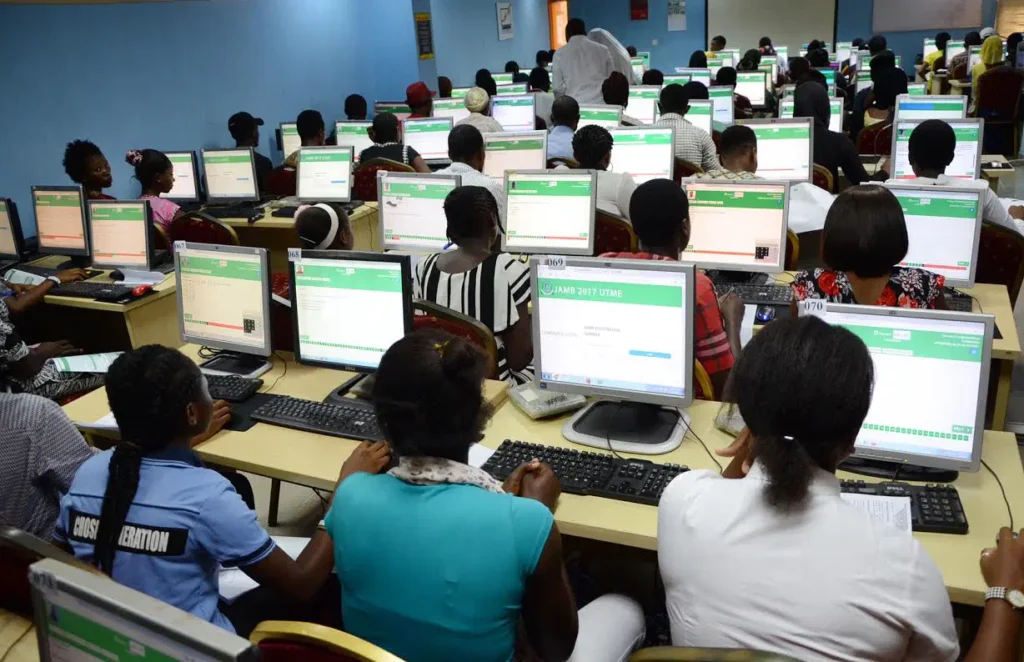The Joint Admissions and Matriculation Board (JAMB) is set to take one of its toughest decisions yet by cancelling the results of 6,319 candidates who were caught using sophisticated technology to cheat during the 2025 Unified Tertiary Matriculation Examination (UTME).
This follows the submission of a comprehensive report by a Special Investigative Panel chaired by Dr. Jake Epelle, the Founder of The Albino Foundation. The panel, which presented its findings to JAMB Registrar, Prof. Is-haq Oloyede, in Abuja, revealed that candidates and accomplices exploited weak points in Nigeria’s examination process, using tools such as AI-assisted image morphing and biometric manipulation to beat security systems.
The recommendation goes beyond result cancellation. Offenders could also face one- to three-year bans and, in some cases, criminal prosecution. For JAMB, the move signals a clear warning that the integrity of national examinations is non-negotiable.

Table of Contents
How Candidates Used Technology to Cheat
The panel’s findings exposed just how advanced exam malpractice has become. According to Dr. Epelle, fraudsters operated syndicates that linked candidates with CBT centre staff, schools, tutorial centres, parents, and even technical collaborators.
The cheating techniques included:
- Finger-blending (4,251 cases): tampering with biometric fingerprint systems so impostors could sit for exams.
- AI image morphing (190 cases): using deep-fake technology to impersonate registered candidates.
- False albinism declarations (1,878 cases): where candidates falsely claimed disabilities to bypass stricter scrutiny.
Beyond these, the report also noted multiple National Identity Number (NIN) registrations, forged documents, and bulk school-led registrations designed to conceal identity fraud.
Epelle described the situation as alarming, warning that without strong action, Nigerians risked raising a generation of “professionals without merit” who could compromise the nation’s future.

The Panel’s Recommendations for JAMB
The Special Panel’s report not only exposed the malpractice; it also laid out practical reforms JAMB must urgently adopt. Key among them are:
- Cancel and sanction: Immediately void all fraudulent results and impose bans ranging from one to three years. Candidates and their collaborators should face prosecution.
- Upgrade technology: Deploy artificial intelligence for biometric anomaly detection, real-time exam monitoring, and a centralised Examination Security Operations Centre.
- Tighten processes: Strengthen verification protocols for persons with disabilities, digitise correction procedures, and outlaw mass registration by schools or third-party agents.
- Reform the law: Amend the JAMB Act and Examination Malpractice Act to recognise biometric and digital fraud as specific offences, with stiffer penalties.
- Ethical campaigns: Launch a nationwide “Integrity First” campaign to discourage malpractice and hold parents accountable, since nearly 80% of cases reportedly involve parental support.
- Restorative justice for minors: For offenders under 18, recommend counselling, rehabilitation, and supervised re-registration instead of outright punishment.
Prof. Oloyede welcomed the recommendations, noting that JAMB would consult the Federal Ministry of Education before adopting wider reforms.
Why This Matters for Nigeria’s Education Future
Examination malpractice in Nigeria is not new, but its growing sophistication poses a deeper threat. Dr. Epelle emphasised that unchecked cheating erodes trust in national assessments and weakens meritocracy. “We must defend the integrity of our education system, otherwise the entire foundation of national development will collapse,” he said.
Registrar Oloyede, in his response, stressed that malpractice is not a victimless crime. A medical doctor, engineer, or teacher who gained admission through fraud, he warned, could endanger countless lives in the future. He condemned the growing trend of parents funding or encouraging malpractice, calling it “a national problem that eats at our values.”
By choosing to act decisively, JAMB is sending a message to all stakeholders—students, parents, schools, and CBT centres—that dishonesty will not be tolerated. The cancellation of 6,319 results may appear drastic, but many educationists argue it is the only way to protect future generations from the long-term damage of compromised standards.

Conclusion
The recommendation to cancel over six thousand results shows just how entrenched malpractice has become. Yet, the bigger story is JAMB’s determination to confront it head-on. Whether through AI-powered security systems, stronger laws, or national campaigns on integrity, the Board appears committed to restoring faith in Nigeria’s examination process.
For students, parents, and educators, the lesson is clear: success in education must be earned, not bought or manipulated. As Dr. Epelle put it, “This is not just about JAMB—it is about the soul of Nigerian education.”
Join Our Social Media Channels:
WhatsApp: NaijaEyes
Facebook: NaijaEyes
Twitter: NaijaEyes
Instagram: NaijaEyes
TikTok: NaijaEyes
READ THE LATEST EDUCATION NEWS





